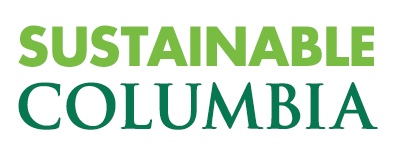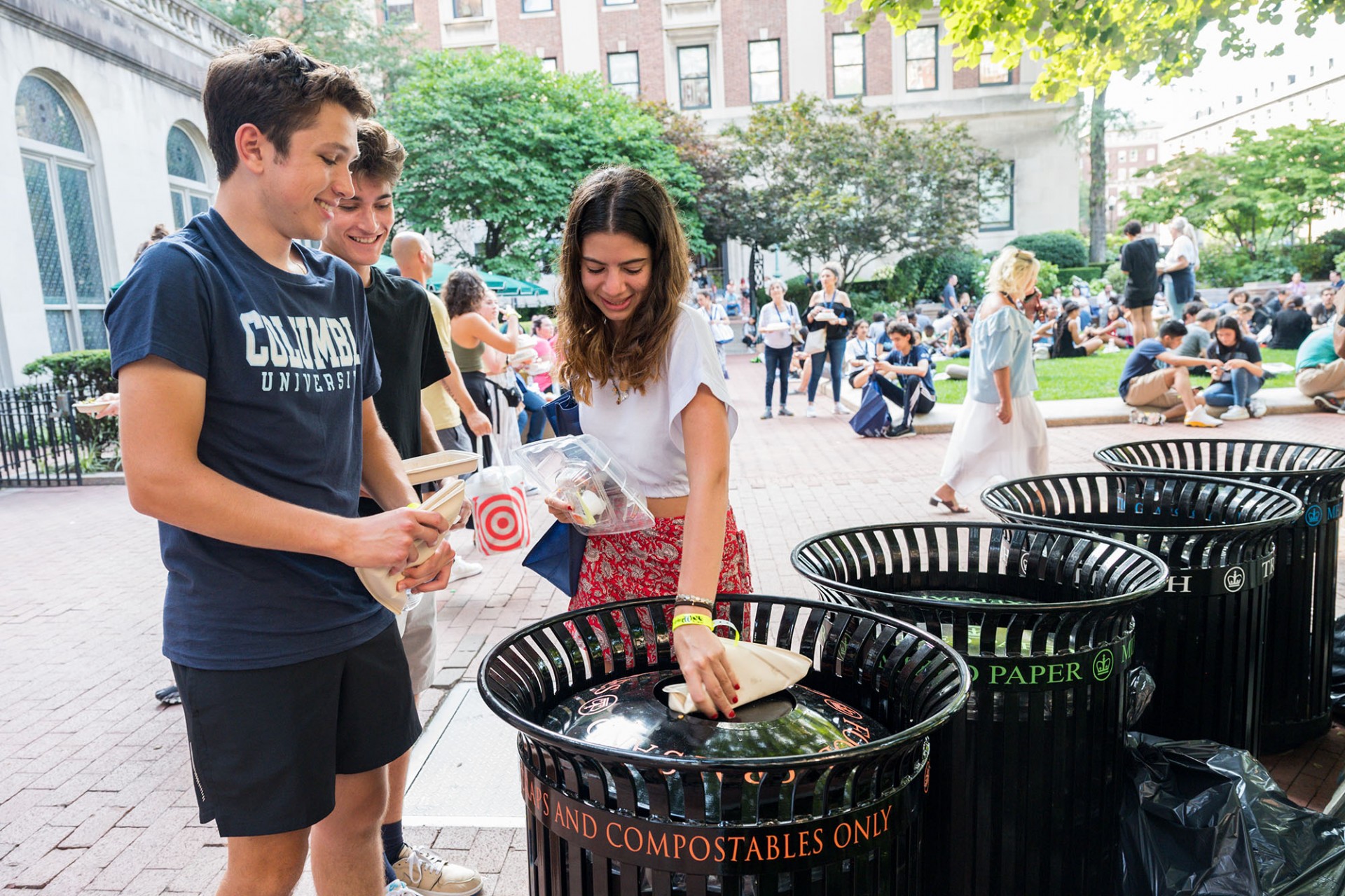Plan 2030 Implementation Pathways
Implementation of Plan 2030 can be separated into two areas of focus: Building Net Zero (BNZ) and Living Net Zero (LNZ). Both are essential to reaching the University's commitment of net zero emissions by 2050 or sooner.
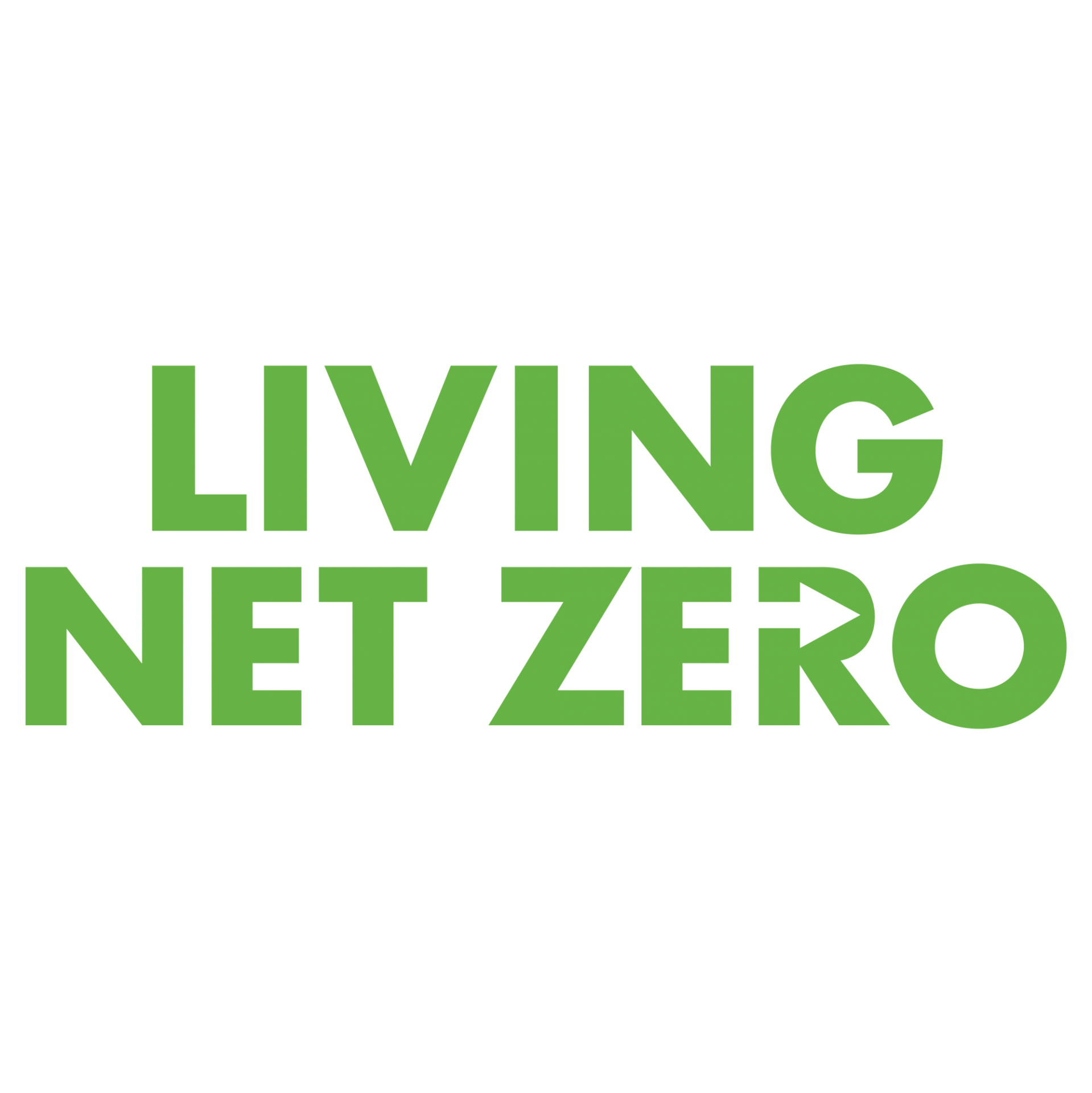
Actions Columbia’s schools, departments, and individuals can take to reduce environmental impact and contribute to Columbia’s sustainability goals.
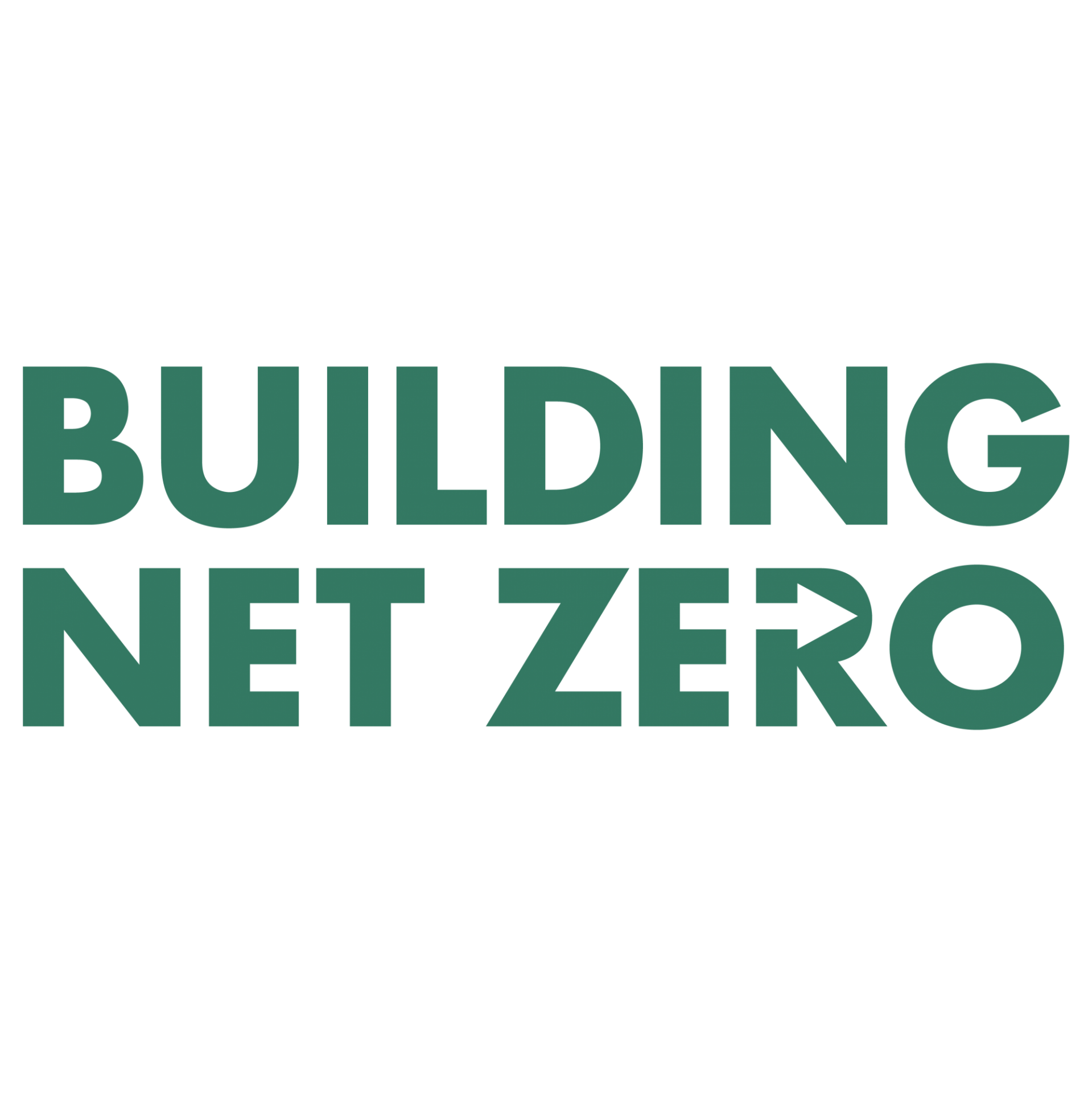
Refers to the operational decisions of the University surrounding energy systems, construction, and other high-level activities that result in Scope 1 and Scope 2 emissions.
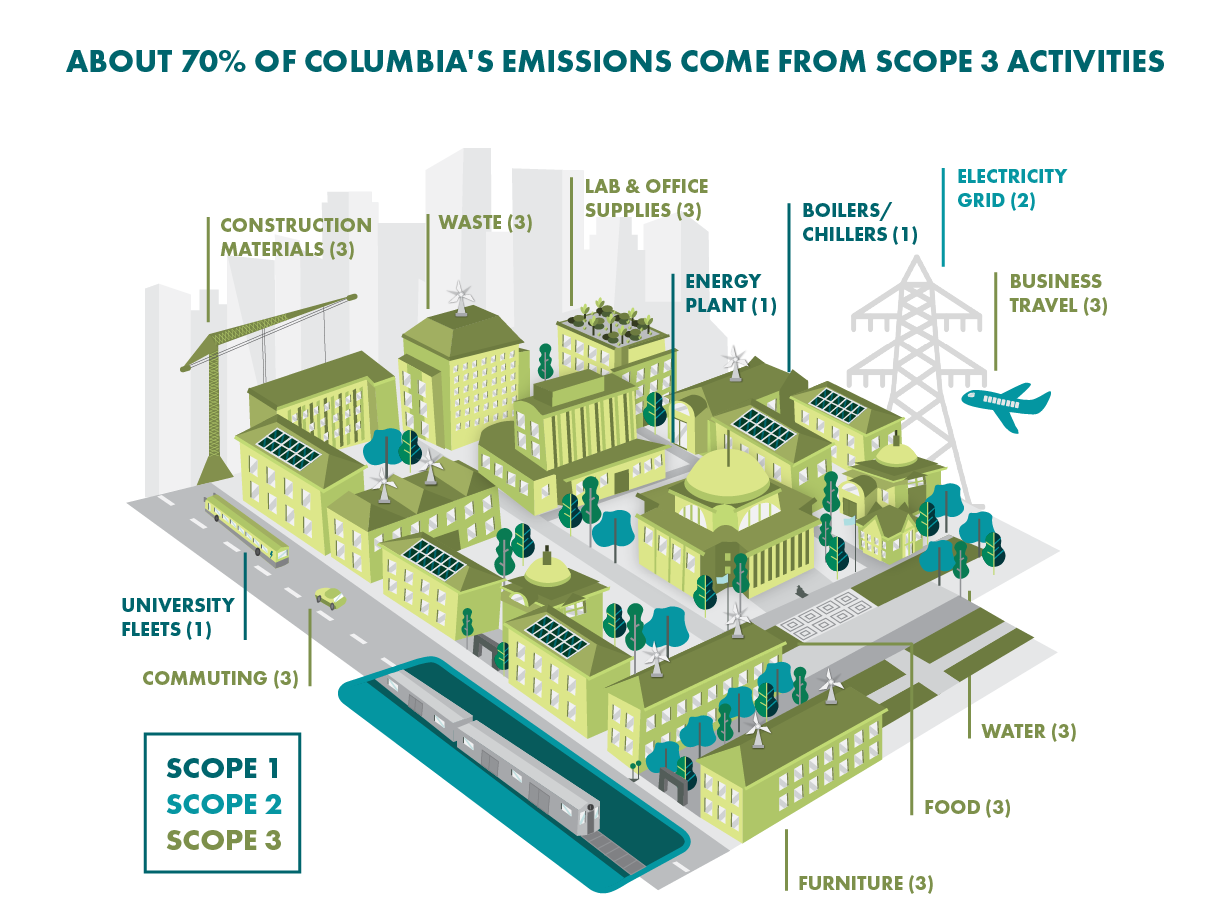
Greenhouse Gas Protocol
The Greenhouse Gas Protocol classifies an organization’s GHG emissions into three “Scopes” for tracking and reporting. To learn more about how each of the Scopes fit into Columbia's Building Net Zero (BNZ) and Living Net Zero (LNZ) categories, see this PDF table.
Focus on Scope 3 Emissions
Think Tanks
Think Tanks are a series of collaborative workshops focused on cutting Scope 3 emissions at the school level.
Representatives from each participating school will attend a series of meetings in one or more of the focus areas:
- Business Travel
- Purchasing of Goods
- Waste and Reuse
The meetings will be in-person sessions on campus, facilitated by the Office of Sustainability, with breakout groups and planned activities for convergent and divergent thinking.
Participants will end the Think Tank track with vetted, innovative solutions to present to their leadership that will help reduce their school's environmental footprint or otherwise improve sustainability.
This process will build the groundwork for a Sustainability Action Plan for your school, which will eventually grow to encompass all Scope 3 categories.
You’ll lead by example, be an early-adopter of the Living Net Zero sustainability program, pave the way for others, and can promote your good work on your public-facing communications channels.
By creating collaborative spaces for key members of each school to come together, we are broadening our brain power around the complex topic of Scope 3 emissions reduction.
This model will create expert advocates within the schools and departments to advance hard conversations around sustainability that can lead to big change.
Columbia’s decentralized business model means department engagement and collaboration are crucial for Columbia to meet its goals. The ability to share lessons-learned within these groups will improve operations across the University.
Meetings will be held on the Morningside Campus. Participants will receive confirmation and specific location details before each session.
Business Travel Dates:
- 3/4: 10:30 a.m. – 12:00 p.m.
- 3/27: 10:30 a.m. – 12:00 p.m.
- 4/10: 10:30 a.m. – 12:00 p.m.
Purchasing of Goods Dates:
- 3/18: 10:30 a.m. – 12:00 p.m
- 4/2: 3:00 p.m. – 4:30 p.m.
- 4/17: 10:30 a.m. – 12:00 p.m
Waste and Reuse Dates:
- 3/25: 1:30 p.m. – 3:00 p.m.
- 4/8: 10:30 a.m. – 12:00 p.m
- 4/22: 10:30 a.m. – 12:00 p.m
The Office of Sustainability asks all Columbia schools to identify one key staff or faculty member to participate in one or more of the listed Think Tanks.
Need more info?
-
Call Daniel Allalemdjian from the Office of Sustainability at 212-854-5571 for more information
-
Invite the Office of Sustainability to meet and present to your leadership team
Confirm your school's participation by emailing Daniel Allalemdjian ([email protected])
Think Tank Focus Areas
Business Travel
In this Think Tank we will analyze travel data, look at best practice research, and think of creative ways to influence the campus community to use alternatives to flying.
A large portion of Columbia's emissions are from business- and Columbia-related air travel. Traveling is necessary for Columbia to achieve its mission, but there are ways to lessen its impact on the environment. This group will be tasked with analyzing travel data, looking at best practice research, and thinking of creative ways to grow awareness for the consideration of alternatives to flying.
- Possibly a faculty member or mid-senior level staff member reporting to the dean or a vice dean.
- Someone who has an understanding of the school's business travel needs and processes, who is passionate about sustainability, can think big picture, is creative, and is excited about leading change.
- Can break large, complex problems into smaller pieces.
- Skilled at identifying barriers and opportunities.
- Excited to collaborate with a cohort of CU department counterparts to develop first-of-their-kind innovative ideas.
- Familiar with culture change.
- Understands the power of data and growing awareness.
Access to school-specific flight data to drive the process.
The Office of Sustainability will provide school-specific travel information for 2023 in Excel, which will be sourced from Columbia’s Concur World Travel data. The data will list every flight that your school paid for, names, and destinations. This info will help guide conversations and drive solutions.
Purchasing of Goods
In this Think Tank we will review best-practice purchasing guidelines and Columbia's departmental data to develop ideas for tracking and reducing emissions from procurement of goods and services.
A significant portion of Columbia’s emissions come from creating and transporting the goods and services Columbia procures. This group will review best practice purchasing guidelines and Columbia's purchasing data to develop ideas that departments can implement to track and reduce emissions from procurement. This group will work to influence the reduction of copy paper, single use items, and plastic water bottles on campus through limiting the purchasing of such products.
- Most likely a senior or mid-level staff member who is responsible for managing purchasing decisions.
- Possibly a chief operations officer, someone working in finance or operations, or their direct report.
- Someone who can reference the school's spending ledger, identify spend categories, or is responsible for the development of purchasing contracts.
- Closely in touch with faculty who make purchasing requests.
- Someone who’s passionate about sustainability, thinks creatively, has a positive attitude, and is motivated to collaborate with other CU department staff in similar positions.
School-specific spend data.
Participants will be asked to analyze their school's spend data to identify opportunity areas such as food, single-use items, and office supplies. They will learn about carbon content labeling and review best-practices in purchasing that will improve sustainability performance. They will consider Columbia’s buying power to leverage change, and review Columbia’s spend data by emissions to seek out the largest emissions categories (eg. food, electronics, furniture).
Waste and Reuse
In this Think Tank we will develop ideas to improve waste diversion at Columbia by increasing the rate of recycling compliance and correct sorting on campus, as well as minimizing personal waste.
This Think Tank group will comprise both students and staff members charged with developing ideas to improve waste diversion at Columbia. The group will learn about recycling in New York City and waste collection at Columbia, and come up with creative ideas to help increase the rate of recycling compliance and correct sorting by everyone on campus. The group will also think about ways to reduce consumption of single use items and minimizing personal waste.
- Staff mid- to senior-level, and students who are interested improving their department's waste diversion.
- Students who are studying Sustainability Management or have an interest in sustainability, waste management, and emissions.
- Participants should have a positive attitude, be collaborative, and eager to think creatively.
Participants will be asked to bring cutting-edge practices that ensure recycling and waste education can be brought to all affiliates. They will learn about waste processing in New York City, as well as at Columbia, and make proposals based on findings. Members will work on ways to achieve 100% reusable water bottle adoption (eliminating single-use plastic bottles) on campus, in addition to similar initiatives.
